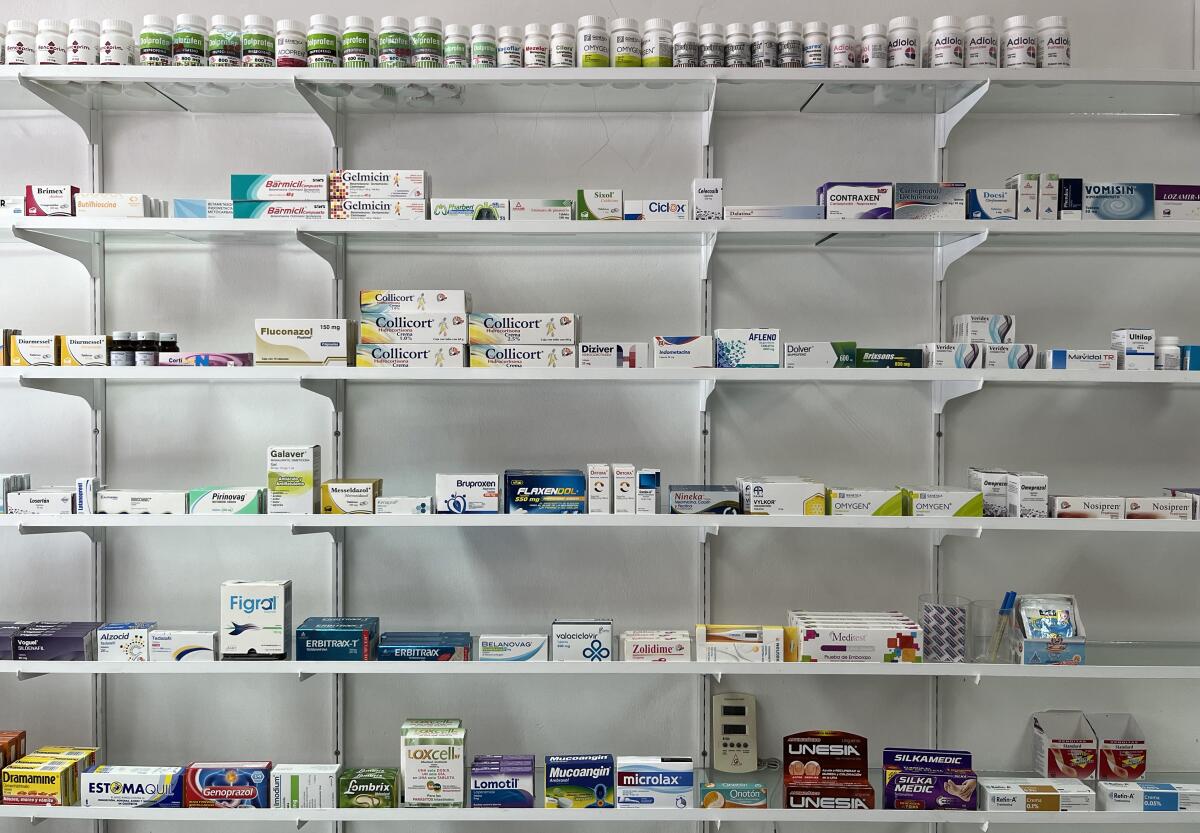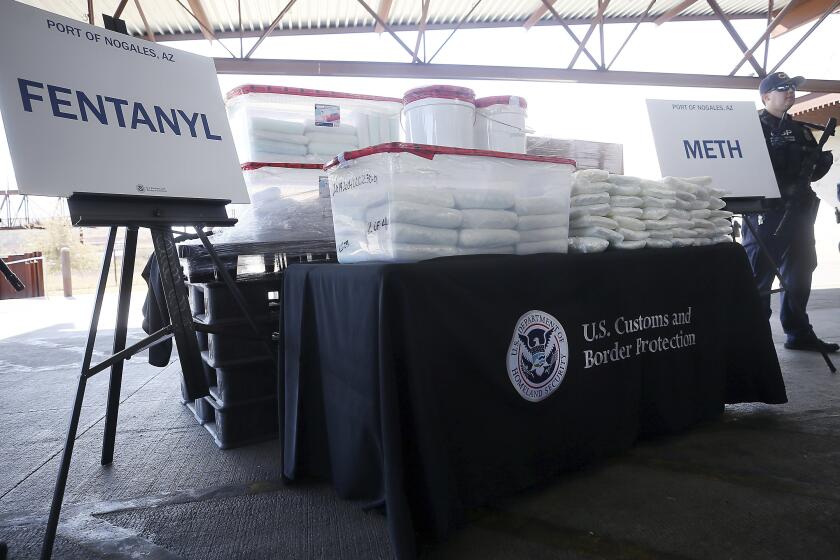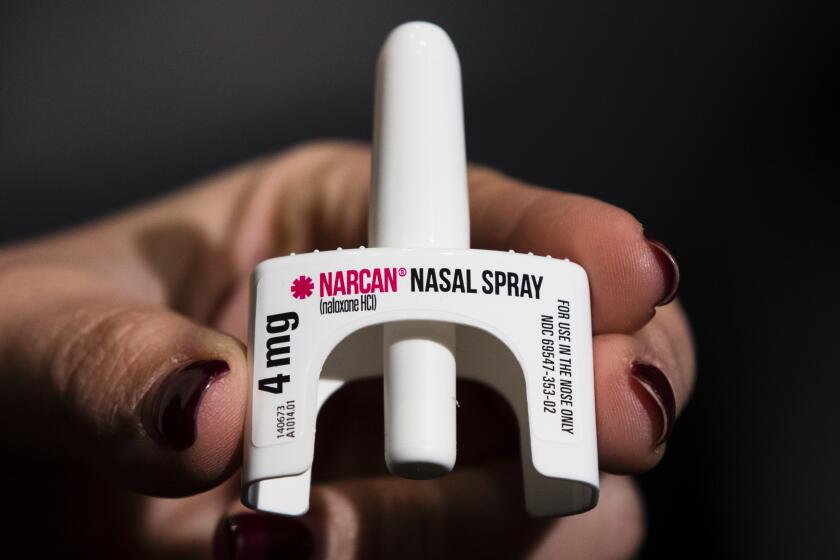Pharmacies selling fentanyl-laced pills are deadly tourist traps in Mexico

- Share via
A warning appeared on Tripadvisor on May 25, 2020: “Cabo pharmacies selling fentanyl laced pills.” The person posting under the moniker Spreadingfacts wrote, “My brother passed away last year after buying pills at a pharmacy in Cabo.” Over several posts, the writer said their brother died after buying what he thought were Oxycontin pills. When his blood was tested it revealed the deadly presence of fentanyl.
At the time, only a vague notice about counterfeit medications was posted on the U.S. Department of State’s online page on travel to Mexico, with no mention that they may contain fentanyl, which can be deadly in small doses, or their easy availability at small pharmacies.
Nor was the notice updated after a Times investigation in February revealed that independent Mexican pharmacies catering to tourists are selling pills that are labeled as oxycodone, hydrocodone and Adderall but are fake and contain fentanyl or methamphetamine. A UCLA study of pharmacies in northern Mexico had similar findings. The investigation confirmed half a dozen cases of people dying from these tainted pills, but the actual death toll is unknown.
Only after being pressed by U.S. lawmakers after The Times’ stories did the State Department in March add a detailed health alert that counterfeit medications being sold at non-chain pharmacies could have deadly consequences.
The latest indictments against Los Chapitos and other alleged smugglers present an opportunity to crack down on trafficking of illegal drugs -- but only if politicians in Mexico and the United States focus on a common goal.
The sluggish response by authorities on both sides of the border is worrisome. Clearly, this is a major public health threat for Mexicans and foreign tourists. The Federal Commission for Protection Against Sanitary Risks, Mexico’s health agency known by its acronym COFEPRIS, finally raided three pharmacies in Los Cabos last month. They arrested four people and seized more than $25,000 in cash and nearly 25,000 pills that the pharmacies were not authorized to sell, though authorities claim none of these pills contained fentanyl or methamphetamine.
Mexico’s denial of the extent of the fentanyl crisis in that country runs deep. Mexican President Andrés Manuel López Obrador has denied that the drug is produced in Mexico despite evidence to the contrary and blames the massive U.S. demand for illicit drugs as the problem. In turn, U.S. authorities blame the Mexican government for not doing enough to combat the drug cartels that are slaughtering people and ravaging cities throughout Mexico.
It’s not surprising that pills containing fentanyl or methamphetamine are being sold illegally in Mexican cities that cater to tourists. But the availability in pharmacies adds a false veneer of legitimacy that magnifies the public health hazard for everyone, not just those seeking opioids for questionable purposes.
For decades, U.S. residents have found cheaper medications in Mexican cities, especially those at the border. The consumers include older people and immigrants who cannot afford needed medication in the U.S. The Adderall shortage in the U.S. could be prompting parents to travel to Mexican cities in search of the medication needed to treat their children’s attention deficit hyperactivity disorder.
If the goal of fentanyl laws is to prevent overdose and poisoning deaths, they should fund testing, treatment and information. Harsher criminal punishment only will only make the next drug even more deadly.
There is increased urgency when it comes to fentanyl, a synthetic opioid that is 50 times more powerful than heroin. A health alert on an obscure State Department web page is wholly insufficient to warn consumers.
Mexico’s COFEPRIS is well aware of counterfeit medicine produced and sold throughout the country, regularly putting out alerts on specific brands that have been falsely manufactured. The agency recently produced a podcast explaining how consumers can spot fake pills by examining the package for specific features such as expiration dates, lot numbers, etc. This lifesaving information should be more widely disseminated in the U.S.
COFEPRIS also regulates pharmacies by conducting inspections, though the agency is well-known for corruption within its ranks. Earlier this year, government leaders fired 11 employees in a corruption crackdown.
But let’s be real. Occasional crackdowns and raids on pharmacies are just stopgap measures that can be counterproductive. Public health researchers have long warned that a law enforcement strategy of seizures and arrests endangers more lives by pushing the market for these drugs further underground, causing more overdoses. A study of enforcement consequences in the July 2023 issue of the American Journal of Public Health confirms this.
A better approach is through public education. Authorities on both sides of the border should consider installing warnings at border crossings, in tourist zones, near pharmacies and other popular tourist areas about the possibility of fentanyl in medications sold at independent pharmacies. In the U.S., government officials should design a social media campaign that could be disseminated on sites such as Reddit, where users routinely trade tips about safe travel to Mexico and purchasing medication.
The Tripadvisor alert three years ago may have been one of the first warnings from the anguished relatives of people who died after taking counterfeit medication purchased in Mexican tourist spots. Another came last month from a mother whose 22-year-old son died after ingesting pills he bought in Ensenada during a stop on the Norwegian Bliss cruise to Mexico last Thanksgiving. She’s hoping Norwegian and other cruise lines will start to issue written warnings to cruise passengers.
Until U.S. authorities start listening to these families, and treating this as the serious public health threat it is, more people will die.
More to Read
A cure for the common opinion
Get thought-provoking perspectives with our weekly newsletter.
You may occasionally receive promotional content from the Los Angeles Times.












